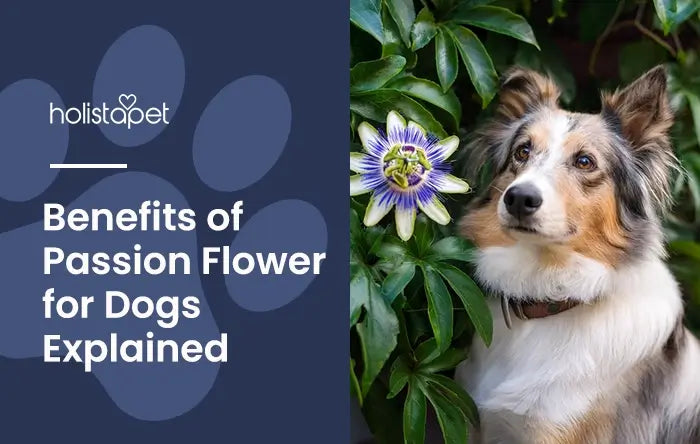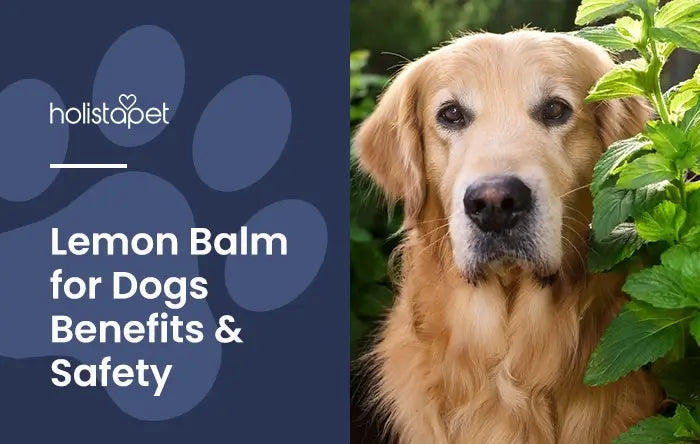Ever noticed your pup pacing the floor after fireworks or a thunderstorm? Passionflower for dogs offers a gentle, natural way to bring calm back to those restless moments. This delicate vine has roots in Central and South America, where people first used it for its calming properties.
Today, pet owners trust it to help anxious dogs settle without heavy medications. Passionflower supports relaxation, eases nervous energy, and encourages balanced moods. It works as a plant-based option that feels safe for dogs of all ages. With its rich history and soothing touch, this herb gives your furry friend the comfort they deserve.
What Is Passionflower?

Passionflower, also called Passiflora incarnata, is a climbing vine with striking purple blooms. It first grew in Central and South America and later spread to the southeastern United States. For centuries, people used it as a natural remedy, counting on its healing properties. The Aztecs brewed it for rest and calm, and Europeans adopted it for sleeplessness and nervous moods.
Modern research links passionflower’s calming properties to compounds like flavonoids and alkaloids. These interact with gamma aminobutyric acid (GABA), a brain chemical that helps regulate nervous system activity. By slowing overactive signals, it encourages balance and promotes a relaxed state.
Passionflower is generally safe for dogs when given in moderation. It can soothe occasional worry, ease agitation, and support emotional well-being without causing heavy sedation.
Potential Benefits of Passionflower for Canines

Passionflower offers several calming benefits for your dog. It can support relaxation and help with separation anxiety. Many pet owners also notice better sleep and fewer restless behaviors. By gently calming the nervous system, passionflower gives anxious dogs a natural way to feel more balanced and at ease in daily life.
Supports Relaxation and Stress Relief
Passionflower helps calm the nervous system without dulling your dog’s spark. As a nervine relaxant, it gently soothes tension and allows anxious dogs to stay alert yet less reactive to stress. Its compounds boost gamma aminobutyric acid (GABA), which slows overactive brain signals and creates a relaxed state.
This herbal medicine may also help stabilize mood by influencing serotonin and dopamine activity. With steady use, you may notice less pacing, whining, or barking during stressful triggers like fireworks, travel, or loud noises.
Helps With Separation Anxiety
Passionflower can ease the worry your dog feels when left alone. It works on GABA receptors in the brain to calm overactive nerve signals. This gentle action helps reduce agitation and supports a more stable mood.
Dogs with a fear of separation often bark, whine, or chew when nervous. Passionflower may soften those reactions, much like anxiety relief, helping them feel more secure. While results vary, many pet owners see improvement when it’s paired with training and comfort strategies. Always check with your vet before adding herbal remedies.
Promotes Restful Sleep
Passionflower encourages deeper rest by calming your dog’s nervous system. It interacts with GABA receptors in the brain, helping slow down busy signals that keep your pup restless at night. By easing mental tension, it sets the stage for smoother sleep cycles.
Studies suggest passionflower can improve overall sleep quality and increase restorative slow-wave sleep. For dogs, this means less tossing, less pacing, and more steady rest. If your canine struggles to settle at bedtime, passionflower may support a natural path to peaceful sleep.
Eases Nervous or Hyperactive Behaviors
Passionflower can help calm dogs that act restless or overly excited. As a nervine relaxant, it slows overactive brain activity without making your dog groggy. This allows pups to stay alert while feeling less reactive to sudden triggers.
Its compounds raise GABA levels, which reduces excessive firing in the brain. This shift helps quiet behaviors like frantic barking, pacing, or jumping. Many dog owners notice smoother moods and calmer responses during stressful events. Used in moderation, passionflower offers gentle support for nervous or high-energy dogs.
Is Passionflower Safe for Dogs?

Passionflower is generally safe for dogs when its medicinal properties are utilized in proper amounts. It relaxes the nervous system without causing heavy sedation, making it a supportive option even for pups struggling with severe anxiety. Most dogs tolerate it well, though too much may bring mild drowsiness or stomach upset.
You should be cautious with pregnant or nursing dogs, or if your pup takes other medications. Passionflower can interact with sedatives, anticoagulants, or drugs that affect the brain. Always check with your vet before adding new herbs to your dog’s care routine.
How Passionflower Works in the Body
Passionflower calms your dog by working with the brain’s GABA system. GABA slows overactive nerve signals, which helps reduce tension and worry. Passionflower boosts GABA levels and encourages a more balanced mood without heavy sedation.
Unlike strong tranquilizers, it does not dull awareness. Instead, your dog stays alert while reacting less to stress triggers like fireworks or travel. By supporting the nervous system in this gentle way, passionflower promotes calm behavior and a relaxed state that feels natural and easy for your pup.
Passionflower Dosage and Use for Dogs
The key to using passionflower safely is following recommended amounts, usually based on your dog’s weight to avoid adverse effects. Too much can cause drowsiness, dizziness, or stomach upset. In proper doses, it supports calm without overwhelming your dog’s system.
Most pet owners give this calming supplement through chews, treats, or blends made for dogs. These forms make dosing simple and reliable. Tinctures and powders can work too, but only with veterinary guidance since strength varies. Always introduce it slowly, monitor your dog’s response, and talk with your vet if your pup takes other medications.
Holistapet Calming Chews With Passionflower

Your dog deserves more than belly rubs when life feels overwhelming. That’s where Holistpaet Calming Chews shine. Each tasty chew blends passionflower with melatonin, chamomile, valerian root, lemon balm, and ashwagandha. Together, these herbs and nutrients create a soothing mix that helps your dog stay cool during stressful events.
Travel, fireworks, and vet visits can all spark nervous energy. These chews help soften those spikes without knocking your pup out. Instead, they encourage steady calm and balanced moods. Dogs enjoy the flavor, while pet parents appreciate the peace of mind.
By pairing passionflower with other trusted botanicals, Holistapet makes it easy to give your canine companion natural support. With consistent use, these chews can help promote comfort, steady rest, and smoother days filled with tail wags.
Alternatives and Complementary Calming Herbs
Passionflower, often enjoyed by people as passionflower tea, is not the only option to ease your dog’s nerves. Several other calming herbs can work alongside it or serve as alternatives if it’s not available. These natural choices can support relaxation and balance in different ways.
- CBD – Cannabidiol is known for its calming benefits. It can ease anxious behaviors and also soothe general discomfort. Holistapet is the #1 online source for pet CBD products.
- Chamomile – This gentle flower helps relax the nervous system. It’s often used for upset stomachs and restless moods.
- Valerian Root – A classic calming herb that promotes rest and supports dogs with noise phobias.
- Lemon Balm – This citrus-scented herb can help reduce agitation and support steadier moods.
- Ashwagandha – An adaptogen that encourages resilience. It helps dogs handle nervous energy and daily stressors more smoothly.
Each herb works differently, giving you flexible, natural tools for pet care.
FAQs – Passionflower for Dogs
Can puppies take passionflower safely?
Puppies should not take passion flower without veterinary guidance. Their bodies are still developing, and herbal remedies may affect them differently than adult dogs. Always check with your vet before introducing any calming herb to young pups. Safety comes first every time.
How quickly does passionflower work in dogs?
Passionflower usually starts working within 30 to 60 minutes. Every dog responds differently, so timing can vary. Some pups may calm down faster, while others need more consistent use. Watch your dog closely and adjust under veterinary guidance for the best results.
Can I give passionflower alongside other calming herbs?
Yes, passionflower often pairs well with CBD, chamomile, valerian root, lemon balm, or ashwagandha. These herbs work in slightly different ways, creating a balanced calming effect. Still, check with your vet before mixing, especially if your dog already takes medications.
Are there any side effects of passionflower for canines?
Passionflower is generally safe, but mild side effects can happen. Some dogs may feel sleepy, dizzy, or have stomach troubles if they get too much. Always use pet-formulated products, follow recommended amounts, and watch your dog’s response when first introducing it.
Final Thoughts – Passionflower Use for Dogs
Passionflower gives your pup a natural way to stay calm during stressful moments. It supports rest, softens nervous energy, and promotes balance without harsh effects. Most dogs handle it well when given in safe amounts.
For pet parents, convenience matters too. Holistapet Calming Chews combine passionflower with melatonin, chamomile, and other soothing herbs. These chews make dosing simple and tasty, just like mixing herbs into a dog’s food, so your pup sees them as a treat.
With gentle, plant-based support, you can help your canine companion feel more at ease and enjoy brighter, calmer days filled with comfort and trust.


 CBD Oil for Dogs - Fast Acting
CBD Oil for Dogs - Fast Acting
 Chicken Flavored CBD Oil For Dogs - Easy Dose
Chicken Flavored CBD Oil For Dogs - Easy Dose
 Salmon Flavored CBD Oil For Dogs - Highly Rated
Salmon Flavored CBD Oil For Dogs - Highly Rated
 CBG Oil for Dogs and Cats - Loved by Thousands
CBG Oil for Dogs and Cats - Loved by Thousands





Leave a comment
All comments are moderated before being published.
This site is protected by hCaptcha and the hCaptcha Privacy Policy and Terms of Service apply.